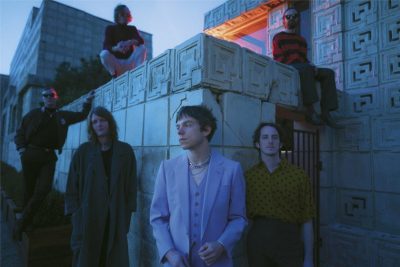
Admittedly, Cage the Elephant is not a band I’ve spent much time listening to. Sure, I’ve jammed to “Ain’t No Rest for the Wicked,” and “Cigarette Daydreams” makes frequent appearances on my playlists. But as a whole, I don’t have much experience with their work.
Thankfully, you don’t have to be a huge Cage the Elephant fan to enjoy their fifth studio album, “Social Cues.”
Right out of the gate, this album just sounds different — the instrumentals are made just as loud as frontman Matt Shultz’s vocals. By keeping their lyrics from outshining the project’s many creative guitar riffs and drum beats, Cage the Elephant makes it ever easier to get lost in the vibe of each individual track.
The project’s greatest strength, however, comes primarily from its impressive variation across all 13 tracks.
After the first 40 seconds of the album’s opening song, “Broken Boy,” I was sure I had “Social Cues” all figured out. With the song’s mechanical beat and heavily autotuned, fast-paced vocals, I was sure I was listening to an experimental album. I figured the sound would initially pique my interest, but after a few tracks, become painfully stale.
Throughout the album, Cage the Elephant seamlessly transitions between upbeat electronic pop and alternative rock, their bread and butter. Every track is placed in just the right spot, keeping the listener on their toes and never allowing them to get bored.
At the turn of each track, I was eager to see how the band would mix elements of their cut-and-dried rock sound with new, experimental techniques. The tracklist of “Social Cues” in itself is a work of art.
No transition exemplifies this more than the change from the seventh track, “House of Glass,” to the eighth, “Love’s The Only Way.”
“House of Glass,” a complete reversal from the track before it, functions very much like a typical grunge track. Its mumbled, angry-sounding vocals are paired with dark and angsty lyrics. With a high-pitched electronic guitar riff, however, the stripped-back vocals serve as a backdrop here to the instrumentals.
As the song culminates in a disorienting flurry of high-pitched guitars, drum beats and a chorus that is yelled rather than sung, the listener is left unprepared for what is essentially the project’s biggest shift.
“Love’s The Only Way” is without a doubt the emotional peak of “Social Cues.” On an album that up to this point is dominated by punchy vocals, Shultz opts to speak to the listener — and his words truly speak for themselves.
During the song, Shultz croons, “Never made the wind blow, never made a heart grow / Never made a dove take flight / Never made the sun rise, still can’t get my heart right / Only ever made mistakes.”
As the artist’s internal struggles are laid bare, they are paired with the slow strumming of a single guitar and the unexpectedly welcome sound of classical strings. For fans of the band, “Love’s The Only Way” will no doubt strike a chord following news of the frontman’s loss of three good friends and separation from his wife in the past two years.
“Love’s The Only Way” feels infinitely more impactful in the wake of the fury of “House of Glass.” In the six minutes and 36 seconds the two songs play out, Cage the Elephant takes the listener on a personal journey from anger and isolation deep into the pits of regret.
Still, in a chorus of melancholic voices, listeners are provided a shimmer of hope in the song’s last words: “Love’s the only way.”
In a world where popular artists like Drake are happy to release a 25-track album made up of essentially two songs, “Social Cues” feels infinitely refreshing. It’s varied, personal, experimental and powerful all while maintaining the band’s rock roots.
By the time the ethereal final track “Goodbye” comes to an end — repeating the song’s title over and over — I couldn’t help but lament the album’s close.





















































































































